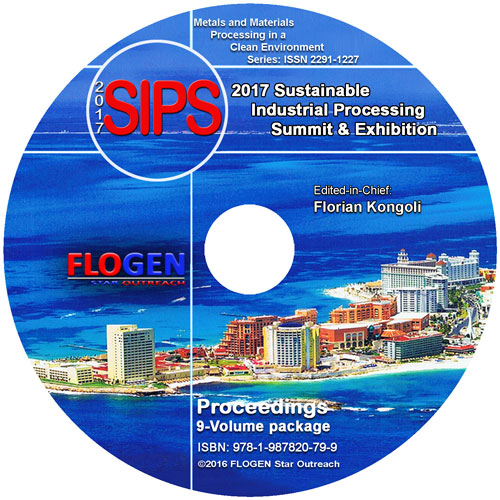2017-Sustainable Industrial Processing Summit
SIPS 2017 Volume 5. Marquis Intl. Symp. / New and Advanced Materials and Technologies
| Editors: | Kongoli F, Marquis F, Chikhradze N |
| Publisher: | Flogen Star OUTREACH |
| Publication Year: | 2017 |
| Pages: | 590 pages |
| ISBN: | 978-1-987820-69-0 |
| ISSN: | 2291-1227 (Metals and Materials Processing in a Clean Environment Series) |

CD shopping page
Cavitation – A Cleaner, Greener, Energy-efficient and Sustainable Processing Technique for Nanomaterials of Wider Technological Applications
Sivakumar Manickam1;1UNIVERSITY OF NOTTINGHAM, KUALA LUMPUR, Malaysia;
Type of Paper: Keynote
Id Paper: 225
Topic: 43
Abstract:
Much effort is currently being devoted to the study of nanomaterials including metallic, inorganic and polymeric materials mainly due to their wide variety of applications. Particularly, nanoparticles have generated a large research effort because of their properties which differ markedly from those of their bulk counterpart. The growing interest in nanostructured materials calls for the development of processing techniques that allow for the tailoring of specific features of the nanometer size. Many different approaches have been applied to the fabrication of nano-entity, such as co-precipitation, microemulsion, supercritical sol-gel processing, hydrothermal synthesis, or high energy ball milling. Directed to the problems of these conventional methods, new synthetic methods have received increased attention in recent years. Cavitation, an approach for synthesizing a variety of compounds at milder conditions is already the rage in materials technology. Cavitation is the formation, growth, and implosive collapse of vapor bubbles in a liquid created by fluctuations in fluid pressure. Due to various advantages, cavitation is widely used in nanomaterials generation. The importance has also been demonstrated not only for the synthesis but also to control shapes and morphologies of nanomaterials and processing techniques such as encapsulation, coating and nanocomposites. Due to its wide advantages, in the last few years, the technique has also started to catch on in the materials science community as a way to speed the discovery of everything in this area. In this presentation, various advanced nanomaterials obtained using this novel technology will be presented. Also, how this technology is effectively utilized in a way that allows to produce particles with characteristics as uniform particle size and crystalline structure will be discussed.